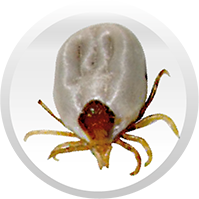October is a wonderful time of year in Sydney, with the wet winter days slowly giving way to longer warmer days heralding the onset of spring. Whilst the sunshine puts a spring into the step of most Sydney-siders, it also marks the start of a dangerous time of the year for our four legged friends – Tick Season.
Sydney’s tick season typically extends from late August to March each year, with unusually wet or warm weather often preceding outbreaks. Each year hundreds of animals in Sydney need Veterinary treatment after being affected by these deadly parasites.

Sydney’s paralysis ticks are grey in color and range in size from 2 or 3mm, up to 10mm after they have had a full feed of blood. Even the smallest of ticks can cause paralysis in cats or dogs by injecting a toxin into the animal’s blood steam as they feed. This toxin is extremely powerful, and can continue to cause signs even after the tick has fallen off, leaving a small dent or ‘crater’ in the animals skin marking the area where the tick was once attached.
Early signs of tick paralysis include a change in bark/meow, lethargy, weakness, and wobbliness in the back legs, which progresses to involve the whole body. Excessive salivation and vomiting or retching can occur, and breathing becomes more labored (often with a grunt, or groan). Left untreated, tick paralysis can rapidly result in coma and death. In some cases sudden death may even occur in the early stages of paralysis.
Prevention is the best medicine when dealing with ticks, and Mosman Vet’s Dr. Rachele Lowe is urging pet owners to be aware that the season is about to start again. “Each year we treat numerous animals for tick paralysis, many of whom are very ill. In so many cases the owners simply get caught out when the season starts. This year we want to get the word out to pet owners in the area to be alert and make sure they start their pets on preventatives now, in order to ensure their animals are safe and protected”.
Tick prevention products include monthly or three monthly chews, top spot products, tick collars, and rinses, with your local vet clinic able to offer free advice on the most suitable product for your pets. Careful daily searching of your pets coat in spring and summer is also recommended in both dogs and cats, even if tick prevention products are in use.
If you are worried that your pet may have a tick or tick paralysis, keep them calm and quiet. Do not offer them anything to eat or drink, and contact your vet immediately. Veterinary treatment including antiserum may be required and can be life-saving for those cats and dogs affected by the tick toxin.
For further information or advice about preventing tick paralysis in your pet or for a free Tick Advice Handout please call Mosman Vets on 02 9960 2856.
Posted on 9 October 2017
Last updated on 11 December 2019
Tagged with: ticks


 What To Do If Your Pet Goes Missing
What To Do If Your Pet Goes Missing
